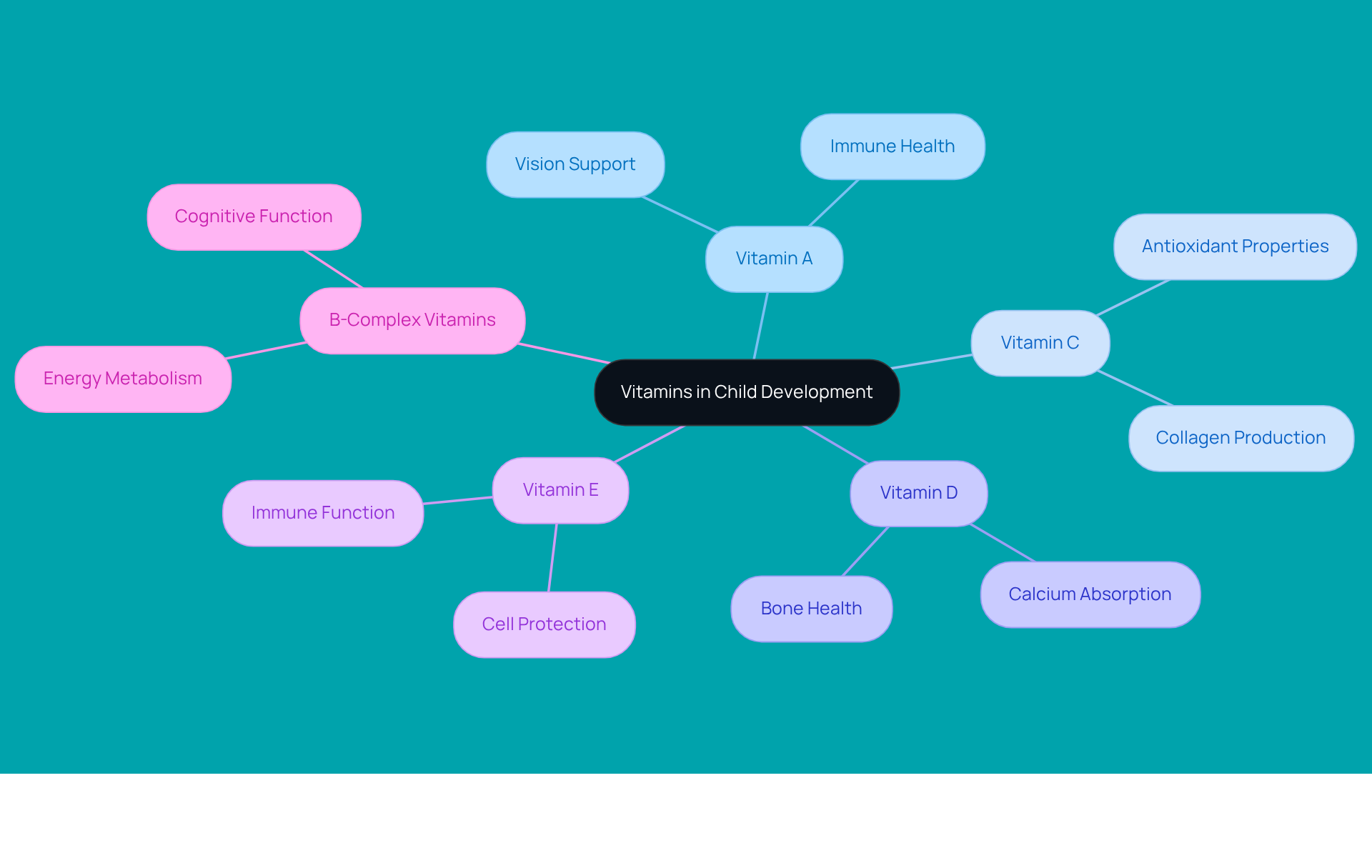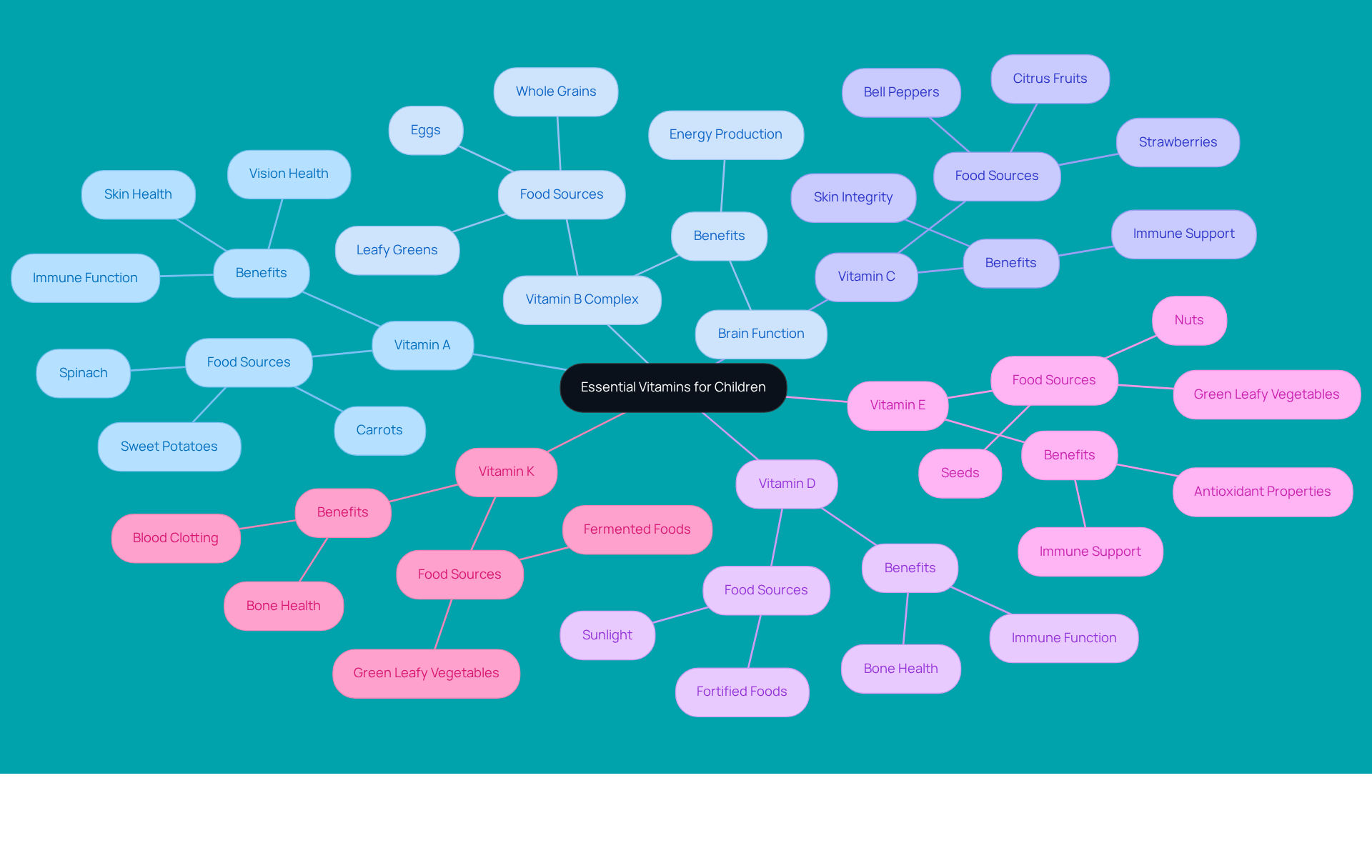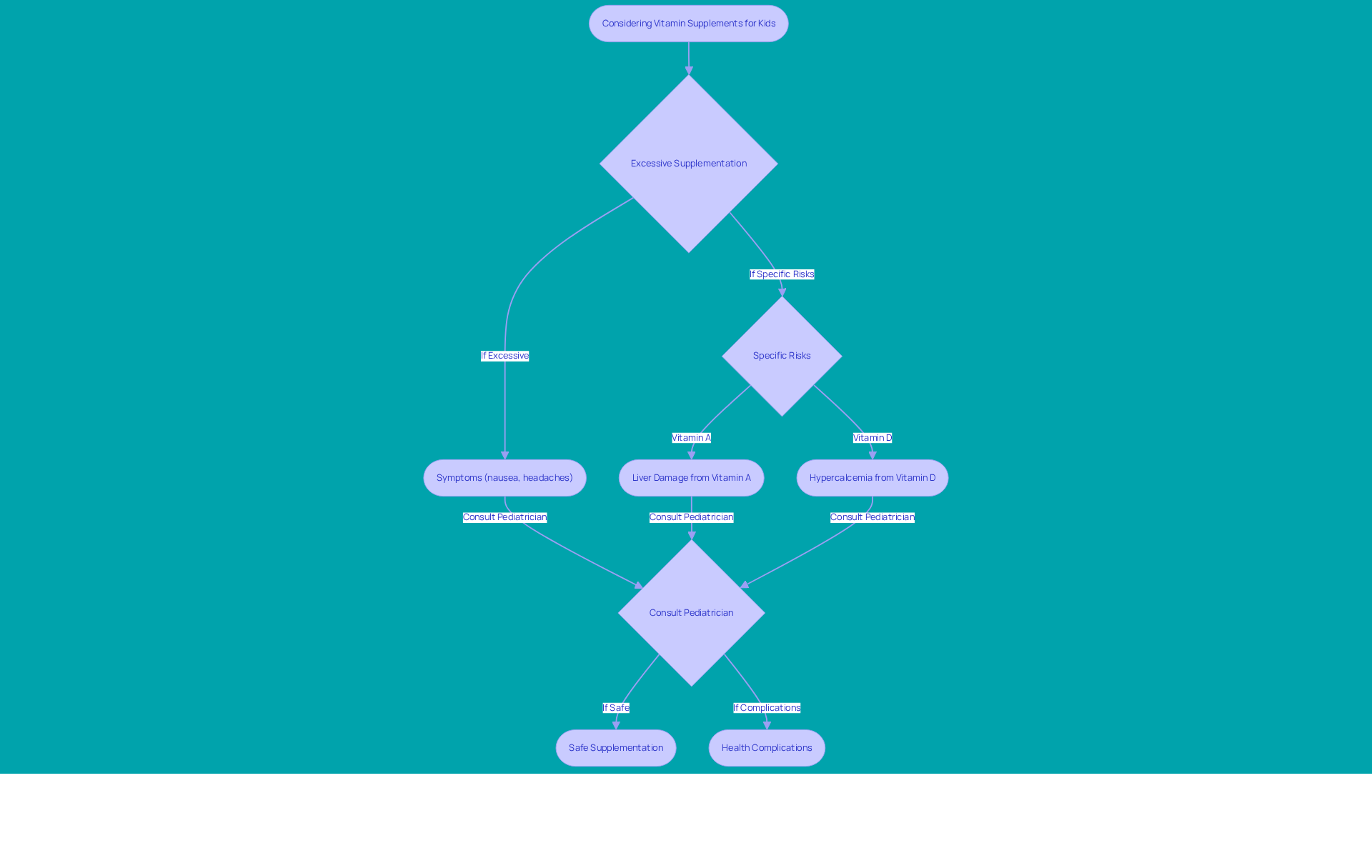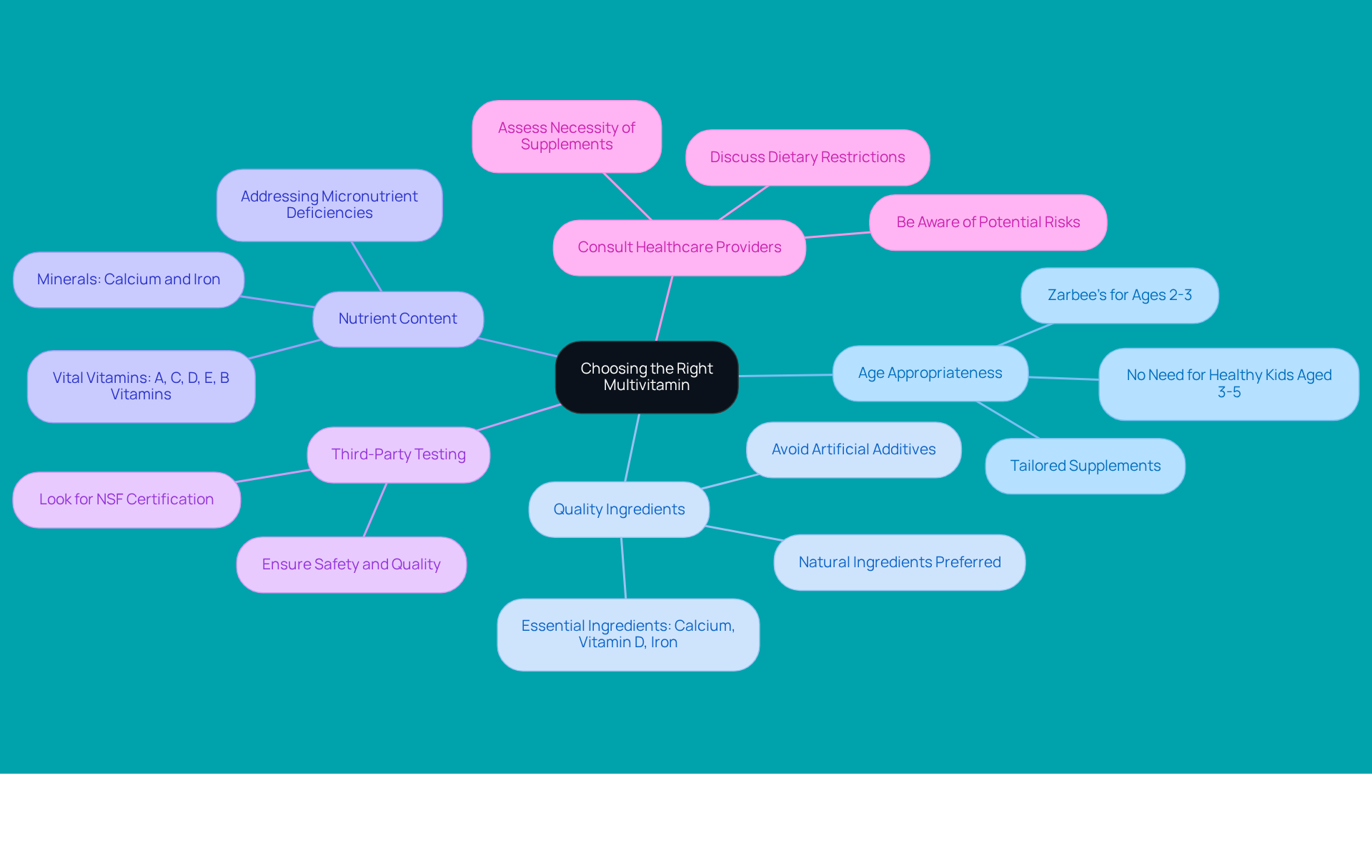Overview
Essential vitamins for kids are crucial for their growth, development, and overall health. Imagine if your child could thrive with the right nutrients! Vitamins A, C, D, E, and the B-complex group play significant roles in various bodily functions, and ensuring they receive these vitamins through a balanced diet is vital. You might be wondering how to prevent deficiencies that can lead to developmental delays and health issues.
It's important to approach this with care, as excessive supplementation without professional guidance can pose dangers. Together, we can support our children's wellness journey by focusing on nourishing foods that provide these essential vitamins.
Introduction
Understanding the critical role of vitamins in a child's development is essential for every parent striving to nurture their child's growth. These vital nutrients not only support physical health but also enhance cognitive function, laying the foundation for a thriving future. Imagine if you could feel confident in your choices for your child's nutrition.
However, amidst the myriad of options available, you might be wondering how to navigate the complexities of vitamin supplementation without falling prey to potential risks. This guide delves into the essential vitamins for children, their benefits, and the careful considerations needed to ensure a balanced approach to nutrition. Together, we can explore how to empower your child's health and well-being.
Explore the Importance of Vitamins in Child Development
Vitamins for kids are essential for their growth and development, playing a significant role in both physical wellbeing and cognitive function. Imagine if your child could thrive with the right nutrients! Essential vitamins for kids, including A, C, D, E, and the B-complex group, are vital for various bodily processes, such as immune response, vision, and energy metabolism. For example, vitamin D is crucial for calcium absorption, which helps build strong bones, while vitamin A supports sight and immune health.
You might be wondering what happens if these nutrients are lacking. Research highlights that deficiencies can lead to developmental delays and health issues. A study titled 'Role of Dietary Calcium and Vitamin D in Growth' explores how dietary calcium and vitamin D affect the growth and development of youth and teenagers. It emphasizes the prevention and treatment of growth delays caused by nutritional deficiencies. The findings suggest that can limit height growth, underscoring the importance of ensuring your child receives enough of these vital nutrients during critical growth periods.
Moreover, nutrient deficiencies have been linked to cognitive impairments, reinforcing the need for a balanced diet rich in vitamins for kids. By understanding the functions of these nutrients, we can make informed dietary choices that enhance our children's overall health and growth. Together, let’s prioritize their nutritional needs and support their journey to a healthier future.

Identify Essential Vitamins for Children: Key Nutritional Requirements
As parents, you want the best for your children, and providing them with a range of vitamins for kids is vital for their growth and development. Key vitamins for kids play a significant role in this journey, and understanding their benefits can help you make informed choices.
- Vitamin A is essential for vision, immune function, and skin health. You can find it in delicious sources like carrots, sweet potatoes, and spinach.
- Vitamin B Complex—which includes B1 (thiamine), B2 (riboflavin), B6, B12, niacin, and folate—is crucial for energy production and brain function. Whole grains, eggs, and leafy greens are excellent sources to consider.
- Vitamin C supports immune function and skin integrity, with rich sources such as citrus fruits, strawberries, and bell peppers.
- Vitamin D is vital for bone wellbeing and immune function, primarily obtained from sunlight and fortified foods.
- Vitamin E acts as an antioxidant and supports immune function, and you can find it in nuts, seeds, and green leafy vegetables.
- Lastly, Vitamin K is essential for blood clotting and bone wellness, found in green leafy vegetables and fermented foods.
As you strive to incorporate a variety of vitamins for kids into your child's diet, remember that each small step contributes to fulfilling their nutritional requirements. Together, we can ensure our children thrive and grow healthy and strong.

Assess Risks and Dangers of Vitamin Supplements for Kids
As caring parents, we understand how essential vitamins for kids are for the wellbeing of our children. However, it's important to recognize that excessive supplementation can lead to significant dangers. Imagine your child experiencing nausea or headaches due to an overdose of fat-soluble vitamins like A, D, E, and K. These symptoms can escalate into more severe health complications.
For instance, did you know that too much vitamin A can cause liver damage? Similarly, high levels of vitamin D may lead to hypercalcemia, which can adversely affect kidney function. Alarmingly, studies reveal that up to 65% of dietary supplements aimed at youth contain nutrient levels that exceed safe upper limits. Since these products are not strictly regulated, they may contain much higher levels of nutrients than what is stated on the label.
Moreover, some supplements can interact with medications or other nutrients. Combining multivitamins with additional supplements or enriched foods can easily push specific nutrient levels beyond safe limits, creating imbalances that could jeopardize your child's health. It's also worth noting that vitamins B3 (niacin) and B6 can lead to considerable issues when consumed in excess.
Therefore, before introducing any vitamins for kids into your child's diet, we encourage you to consult with a pediatrician. Together, we can ensure that these additions are both necessary and safe, paving the way for a .

Choose the Right Multivitamin: Guidelines for Parents
When it comes to , it’s important to follow some thoughtful guidelines to ensure they receive the optimal health benefits they deserve.
- Age Appropriateness: Begin by choosing a dietary supplement tailored specifically for your child's age group. For instance, Zarbee’s dietary supplement is ideal for little ones aged 2 to 3, while other brands cater to older children, ensuring that nutrient levels align with their developmental needs. You might be wondering, according to the American Academy of Pediatrics, children aged 3 to 5 generally do not require dietary supplements if they are growing normally and enjoying a variety of foods.
- Quality Ingredients: Next, look for products that are free from artificial colors, flavors, and sweeteners. Opt for supplements with natural ingredients, as these are often safer and more beneficial for your little ones. Dr. O’Connor emphasizes that a good children’s dietary supplement should contain calcium, vitamin D, and iron.
- Nutrient Content: It’s also essential to ensure the supplement includes vital vitamins and minerals, particularly vitamins A, C, D, E, and the B vitamins, along with minerals like calcium and iron. A quality dietary supplement should provide these crucial nutrients to support growth and immunity. Dr. Burgert notes that dietary supplements can help address specific micronutrient deficiencies, especially for children with selective eating habits.
- Third-Party Testing: Be sure to select brands that undergo third-party testing for quality and safety. Look for certifications like 'NSF certified' to confirm that the product meets label claims and is free from harmful substances.
- Consult Healthcare Providers: Finally, always consult with your pediatrician before starting any supplement. This step is vital to determine if a dietary supplement is necessary and safe for your child, particularly if they have specific dietary restrictions or health concerns. It’s also important to be aware of potential risks associated with dietary supplements, such as upset stomach or interactions with medications.
By following these caring guidelines, you can confidently choose vitamins for kids that support your child's health and development, ensuring they receive the essential nutrients for optimal growth. Together, let’s empower your child’s wellness journey!

Conclusion
Understanding the essential vitamins for kids is crucial for their overall growth, development, and cognitive function. These vital nutrients—vitamins A, C, D, E, and the B-complex group—play significant roles in supporting immune health, vision, and energy metabolism. Imagine if ensuring children receive these important vitamins through a balanced diet could help prevent deficiencies that may lead to developmental delays and health issues.
This article highlights the importance of incorporating a variety of vitamins into children's diets while also addressing the potential risks associated with excessive supplementation. Parents are encouraged to be mindful of the sources of vitamins, the necessity of consulting healthcare providers before introducing supplements, and the importance of selecting age-appropriate and quality products. This thoughtful approach not only safeguards children's health but also empowers parents to make informed dietary choices.
Ultimately, prioritizing the nutritional needs of children lays the foundation for their healthy future. By focusing on a balanced diet rich in essential vitamins and being cautious with supplementation, parents can significantly impact their children's growth and cognitive development. Taking these steps ensures that children not only thrive physically but also reach their full potential in all aspects of life. Together, we can nurture a brighter future for our children.
Frequently Asked Questions
Why are vitamins important for child development?
Vitamins are essential for children's growth and development, playing a significant role in physical wellbeing and cognitive function.
Which vitamins are considered essential for kids?
Essential vitamins for kids include A, C, D, E, and the B-complex group.
What bodily processes do these vitamins support?
These vitamins support various bodily processes such as immune response, vision, and energy metabolism.
What is the role of vitamin D in child development?
Vitamin D is crucial for calcium absorption, which helps build strong bones.
How does vitamin A contribute to a child's health?
Vitamin A supports sight and immune health.
What are the consequences of vitamin deficiencies in children?
Deficiencies can lead to developmental delays and health issues.
What does the study 'Role of Dietary Calcium and Vitamin D in Growth' emphasize?
The study emphasizes the prevention and treatment of growth delays caused by nutritional deficiencies, highlighting the importance of adequate calcium and vitamin D intake for height growth.
How do nutrient deficiencies affect cognitive function in children?
Nutrient deficiencies have been linked to cognitive impairments, reinforcing the need for a balanced diet rich in vitamins.
What can parents do to support their children's nutritional needs?
Parents can make informed dietary choices that enhance their children's overall health and growth by understanding the functions of essential nutrients.



